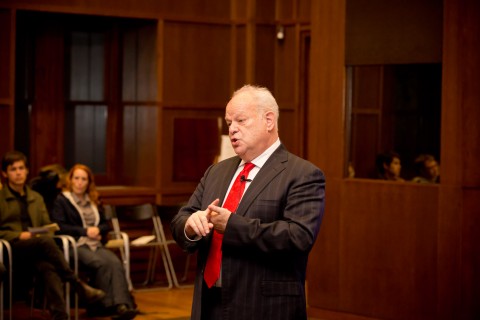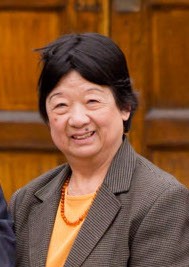The TANG Foundation recently awarded its first-ever prize for Achievements in Psychology to Dr. Martin E.P. Seligman, Director of the Penn Positive Psychology Center and Zellerbach Family Professor of Psychology in the University of Pennsylvania’s Department of Psychology.
A marker of the high honor be ing bestowed, the award comes with a cash prize of $100,000 (CAD). Dr. Seligman, who founded the field of positive psychology while President of the American Psychological Association, was presented with the award on Nov. 12th in Toronto, Ontario, Canada. The prize was created by Dr. Fay Tang of the TANG Foundation and adjudicated by the University of Toronto’s Department of Psychology.
ing bestowed, the award comes with a cash prize of $100,000 (CAD). Dr. Seligman, who founded the field of positive psychology while President of the American Psychological Association, was presented with the award on Nov. 12th in Toronto, Ontario, Canada. The prize was created by Dr. Fay Tang of the TANG Foundation and adjudicated by the University of Toronto’s Department of Psychology.
In a recent interview, Dr. Tang said that “mental health and psychological well being are just as important as physical health,” and it is the endeavor of the Tang Foundation and its eponymous prize to raise awareness on the importance of psychological health in the world. She further underscored that many people in the world don’t understand the importance of investing in mental health and well-being, and that psychological and physiological health are inextricably intertwined.
As such, there was perfect alignment with Dr. Seligman’s goals for his own work in creating flourishing societies, making him an obvious choice to be the winner of the first Tang Prize. In a beautifully ornate wooden-paneled room adorned with large windowpanes overlooking the University of Toronto campus, Dr. Fang presented the award to Dr. Seligman before a packed room, an audience of around 100 people, which included academics, students and Dr. Seligman’s family and friends.
Upon accepting the award, Dr. Seligman graciously noted, “It’s within the endeavor [to increase well-being worldwide] that I think the Tang Foundation today has given a great boost to the field.” When later asked how he felt receiving the award, Dr. Seligman said “I am very grateful to be the first recipient of this award. More importantly, it recognizes and helps legitimize the entire positive psychology endeavor.”
Dr. Seligman described his time as an early researcher focusing his efforts on psychological suffering such as depression, anxiety, helplessness, hopelessness, suicide, and the like. In further studying Learned Helplessness, which is the feeling that nothing you do in the present or future matters, he noticed that nearly one third of people could not be made to feel helpless; instead they continued to bounce back from adversity and prevail over obstacles against all odds. While he saw this as a precursor to the study of optimism, studying happiness was erstwhile perceived as self-indulgent and hedonistic. An early study about the transient happiness of lottery winners further augmented the belief that seriously studying happiness was not worthwhile. This notion, however, was wrong.
Twenty-five years later, Seligman became President of the American Psychological Association. He spent a great deal of time contemplating the future of Psychology alongside some of the field’s most brilliant minds in a house formerly owned by iconic rock band The Grateful Dead (note the parallelism of the rockstars of Psychology converging in a space formerly owned by rockstars of music) during a retreat to Mexico to discuss, brainstorm, and ideate what would then become the field of Positive Psychology. Dr. Seligman recalls talking “for about a week about founding a field whose premise would be well-being, whose premise would be about asking the question, ‘what makes life worth living?’”
A few months later, in his Presidential Address to the APA he made a call for researchers to focus on the factors that promote well-being rather than just concentrating on correcting the damages of psychopathology. He called for a field that would complement rather than replace traditional psychology, insisting that studying strengths is just as important as studying weaknesses. By focusing on what makes life worth living instead of what is wrong with us, we can nurture our talents and improve life, Dr. Seligman noted.
Once he refocused his own scholarly work toward positive psychology, Seligman quickly received grant funding from the Jon Templeton Foundation and an anonymous donor. The lack of funding for the study of well-being changed entirely. Over the years, he believes there has been between 100 and 200 million dollars in funding across the field of positive psychology.
Since its inception, the field of positive psychology has grown rapidly. Seligman has written more than 250 scholarly publications and over 20 books, including his two most well-known publications, Authentic Happiness and Flourish. His achievements have led to the founding of the field of positive psychology alongside a model of wellbeing, which encompasses the scientific study of positive emotions, engagement, relationships, meaning, and achievements - PERMA for short. With the expansion of the field other topics of interest have emerged, such as the study of positive character traits, positive institutions, and positive education.
The field of positive psychology has long relied on individuals filling out questionnaires about their own happiness, and Dr. Seligman sees the future of the field in Big Data. He cited a recent study that mined Twitter and Facebook posts for more than 45,000 words related to well-being. The word clouds created in the study were used to predict heart disease within communities.
In his own future work, Dr. Seligman intends to focus his time and energy on Prospection, the idea that we are driven by possible futures rather than a static past. He believes we can use statements about the future to predict future outcomes. Additionally, those in the field need to connect these ideas to originality, creativity and innovation.
By 2051, 51 percent of the adults in the world could have high well-being if the “father of positive psychology” has his way. “This is the moon shot goal of positive psychology,” Dr. Seligman asserted during his speech in Toronto. While it may seem like a moon shot goal, Dr. Seligman makes this claim with such unwavering confidence that human flourishing at such a large scale seems like it is well within our reach.


 The MacArthur Fellowship Program announced Wednesday that
The MacArthur Fellowship Program announced Wednesday that  ing bestowed, the award comes with a cash prize of $100,000 (CAD). Dr. Seligman, who founded the field of positive psychology while President of the American Psychological Association, was presented with the award on Nov. 12th in Toronto, Ontario, Canada. The prize was created by Dr. Fay Tang of the TANG Foundation and adjudicated by the University of Toronto’s Department of Psychology.
ing bestowed, the award comes with a cash prize of $100,000 (CAD). Dr. Seligman, who founded the field of positive psychology while President of the American Psychological Association, was presented with the award on Nov. 12th in Toronto, Ontario, Canada. The prize was created by Dr. Fay Tang of the TANG Foundation and adjudicated by the University of Toronto’s Department of Psychology.  Notoriously private, Dr. Fay Tang has rarely engaged with the media. So when she agreed to open her heart, her legacy, her struggles and her triumphs to me in a recent interview, I knew I was in for a treat. The interview’s premise was to discuss the big win for Dr. Seligman and Positive Psychology that was receiving the first-ever Tang Prize for Achievements in Psychology, and maybe glean a quote or two from it. What it ended up being was so much more; a rich tapestry of history, legacy, passion, challenge and triumph.
Notoriously private, Dr. Fay Tang has rarely engaged with the media. So when she agreed to open her heart, her legacy, her struggles and her triumphs to me in a recent interview, I knew I was in for a treat. The interview’s premise was to discuss the big win for Dr. Seligman and Positive Psychology that was receiving the first-ever Tang Prize for Achievements in Psychology, and maybe glean a quote or two from it. What it ended up being was so much more; a rich tapestry of history, legacy, passion, challenge and triumph.